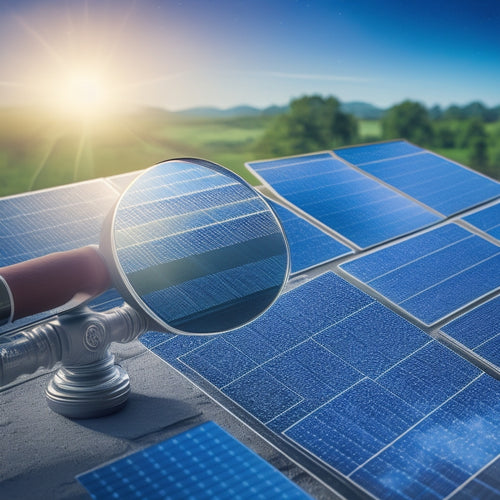
What Are the Essentials to Consider When Buying Solar Panels
Share
When buying solar panels, you'll want to contemplate several key factors to guarantee a successful and cost-effective shift to renewable energy. Start by evaluating your energy needs, including your average daily consumption, usage patterns, and future requirements. Then, research the types of solar panels, including monocrystalline and polycrystalline, and evaluate their efficiency ratings, taking into account factors like available space and energy needs. You'll also need to reflect on installation costs, warranty, and maintenance support, seeking transparency and clarity in quotes and warranties. By understanding these essentials, you'll be well-prepared to make an informed decision and maximize your solar investment's potential.
Key Takeaways
- Assess your energy needs by reviewing past electricity bills and considering future requirements to determine the ideal solar panel system size.
- Choose the right solar panel type (monocrystalline or polycrystalline) based on your budget, available space, and energy needs.
- Evaluate panel efficiency ratings, considering factors like roof space and performance degradation to ensure optimal energy production.
- Consider installation costs, including hardware, labor, and permits, and explore financing options and incentives to offset upfront costs.
- Review warranty terms, maintenance requirements, and transferability to ensure long-term performance and potential resale value.
Assessing Your Energy Needs
Your energy consumption pattern is a critical factor in determining the right solar panel system for your home. It's crucial to understand your energy usage habits to guarantee you get a system that meets your needs. Start by reviewing your past electricity bills to determine your average daily energy consumption in kilowatt-hours (kWh).
Consider your energy usage patterns, such as peak hours and seasonal variations. This information will help you determine the size of the solar panel system you need.
Think about your future energy requirements as well. Are you planning to add more appliances or family members, which could increase your energy consumption? Considering future expansion will verify your solar panel system can accommodate your growing needs.
You should also consider any energy-efficient upgrades you've made to your home, such as new windows or insulation, which could reduce your energy consumption.
Understanding Solar Panel Types
With the right-sized solar panel system in mind, it's vital to focus on the type of solar panels that will power your home.
You'll encounter two primary types: monocrystalline and polycrystalline panels. Monocrystalline panels are made from a single crystal of silicon, giving them a more uniform appearance and higher efficiency rates. They're more expensive, but they're also more durable and better suited for small spaces.
Polycrystalline panels, on the other hand, are composed of multiple crystals of silicon. They're less expensive, but their efficiency rates are slightly lower. They're still a popular choice, especially for larger installations.
When choosing between these two, consider your budget, available space, and energy needs. While both types are reliable, it's important to understand their differences to make an informed decision.
Evaluating Panel Efficiency Ratings
Most solar panels on the market boast efficiency ratings between 15% and 22%.
But what does this rating actually mean? Fundamentally, it measures a panel's ability to convert sunlight into usable energy. A higher efficiency rating indicates that more of the sun's energy is being converted into electricity.
When evaluating panel efficiency ratings, you'll want to take into account how this impacts your energy needs. For instance, if you have limited roof space, high-efficiency panels may be a better option to maximize energy production.
It's also important to reflect on performance degradation, which refers to the gradual decline in a panel's energy conversion capabilities over time.
Look for panels with a lower degradation rate to guarantee they continue to perform well over their lifespan.
When comparing different panels, be sure to take into account the efficiency rating in conjunction with other factors, such as durability and warranty.
Considering System Installation Costs
As you weigh the merits of different solar panels, it's equally important to evaluate the costs associated with installing the system.
Installation costs can vary greatly depending on factors such as system size, installation complexity, and local labor rates. When comparing installation quotes, be sure to factor in all the costs, including hardware, labor, and permits.
Also, consider the financing options available to you. Many solar installers offer financing plans or partner with lenders to provide affordable financing solutions. You may also be eligible for federal and state incentives, such as tax credits, that can help offset the upfront costs.
When evaluating installation quotes, look for transparency and clarity on the costs and services included.
Be wary of quotes that seem too good to be true or those that don't provide a detailed breakdown of the costs.
Warranty and Maintenance Support
You'll want to carefully examine the warranty and maintenance support offered by solar panel manufacturers and installers. A thorough warranty and dependable maintenance plans can provide you with peace of mind and protect your investment.
When evaluating warranty terms, consider the following key aspects:
| Warranty Aspect | What to Look For |
|---|---|
| Duration | A minimum of 25 years for the solar panels and 10 years for the inverters |
| Coverage | Extensive coverage for parts, labor, and performance |
| Transferability | Warranty transferable to new owners if you sell your property |
| Maintenance Requirements | Clear guidelines on maintenance schedules and procedures |
Look for manufacturers and installers that offer strong warranty terms and maintenance plans. A good warranty should cover repairs, replacements, and performance guarantees. Additionally, consider the maintenance requirements and schedules to guarantee you can easily keep your system running at peak levels. By carefully evaluating the warranty and maintenance support, you can secure a hassle-free solar panel ownership experience.
Frequently Asked Questions
Can I Install Solar Panels on My Rental Property?
You'll need to review your tenant agreements and discuss installation costs with your landlord before installing solar panels on your rental property, ensuring a mutually beneficial agreement that suits both parties' interests and investment goals.
Do Solar Panels Work During Power Outages?
You're wondering if solar panels will save you during a blackout - the answer is, it depends. If you have a solar battery and a grid connection, you'll be okay, but without a battery, you'll be left in the dark, just like your neighbors.
Are Solar Panels Affected by Shade From Trees?
When you're considering solar panels, you'll find that shade from trees can considerably impact their performance, reducing solar panel efficiency. However, you can implement shade mitigation strategies, like pruning trees or installing panels at an angle, to minimize the effects and maximize energy output.
Can I Install Solar Panels on a Metal Roof?
You're about to reveal a wealth of renewable energy! When installing solar panels on a metal roof, you'll reap metal roof advantages like durability and weather-tightness, but be prepared to tackle installation challenges like specialized mounting systems and potential rust concerns.
Do Solar Panels Increase My Property Value?
You'll be pleased to know that solar panels can enhance your property value, thanks to solar incentives that offset installation costs, making your home more attractive to potential buyers and increasing its resale value.
Conclusion
As you wrap up your solar panel shopping spree, remember that it's not a one-size-fits-all deal. Think of it like tailoring a bespoke suit - you need to evaluate every detail to get the perfect fit. According to the US Department of Energy, a well-chosen solar panel system can save you up to $500 annually on electricity bills. By reflecting on these essentials, you'll be well on your way to utilizing the sun's energy like a pro, and reaping the rewards for years to come.
Related Posts
-

Solar Panel System Certification Costs: A 10-Point Breakdown
You're looking to understand the costs associated with solar panel system certification. Your total certification cos...
-

Top 10 Tips for Buying Car Accessories Online
When purchasing car accessories online, you should take proactive steps to avoid low-quality or incompatible products...
-

7 Ways to Save on Residential Home Solar Panels
You can save thousands on your residential home solar panels by leveraging financial incentives, dealer offers, and s...


